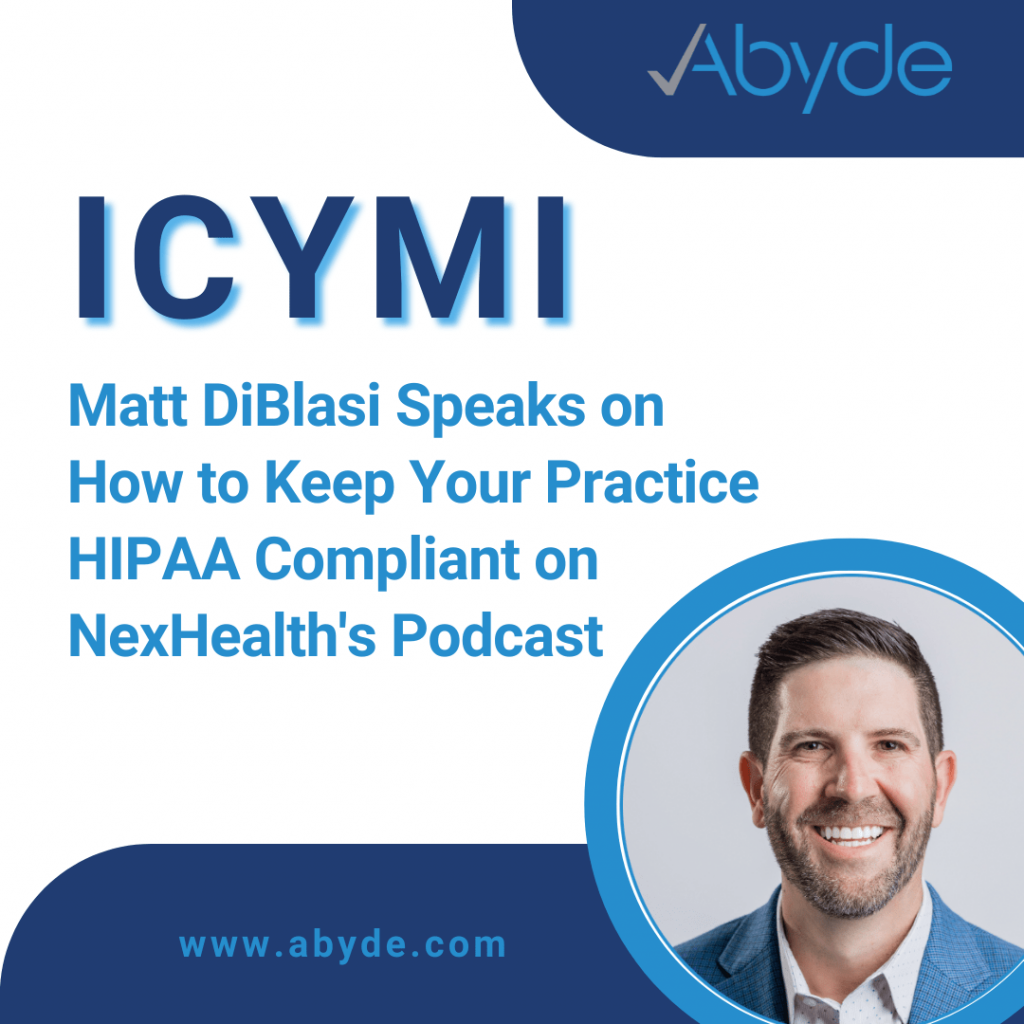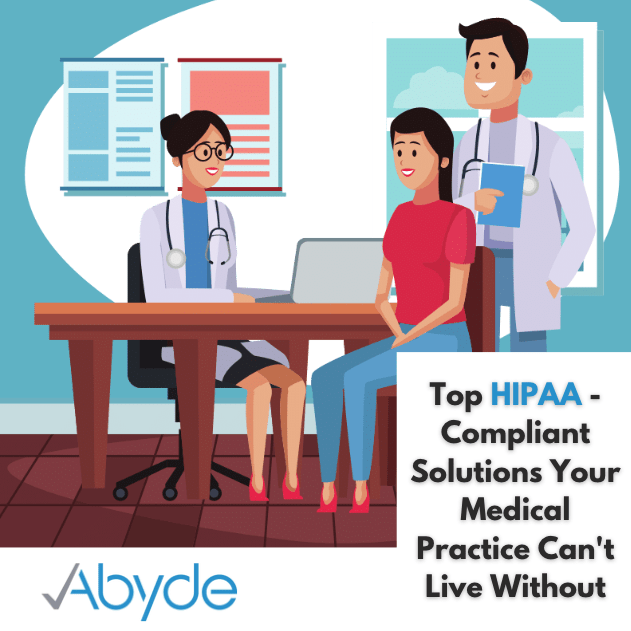June 20, 2023 In Case You Missed It: We are sharing some exciting insights from our CEO, Matt DiBlasi’s recent conversation on NexHealth’s podcast, How I Grew My Practice. This discussion explores the intricacies of HIPAA compliance and the crucial role data security plays in healthcare. In this interview, Matt simplifies the complex landscape of HIPAA compliance and we want to highlight some key takeaways here. Whether you’re a healthcare professional, an office manager, or just curious about compliance, you’ll find value in Matt’s expert perspective. ✍ Documentation – Matt stresses the importance of streamlining HIPAA compliance by segregating it into digestible, actionable steps. The security risk analysis (SRA) is the first and fundamental stride towards this accomplishment. Just as tax payments require accurate records, organizations must produce verifiable evidence of their commitment to compliance. SRAs are crucial for pinpointing potential weaknesses and instituting protective measures for critical data. 🎓 Education – A common obstacle organizations face in striving for HIPAA compliance is the need for adequate education and knowledge. Matt asserts that the size of the organization or the practice does not influence its responsibility toward HIPAA compliance. Practices need to be more aware of vulnerabilities due to insufficient knowledge. Here, dependable sources for educational insights become invaluable. Professional organizations, like dental and medical associations, often serve as excellent platforms for understanding the nuances of HIPAA compliance. 🔁 Consistency – While different healthcare practices may have unique quirks, the HIPAA compliance prerequisites are identical across all sectors. Office and business managers are typically tasked with ensuring compliance, often dealing with constraints in resources and expertise. Instituting a comprehensive compliance protocol that aligns with the required physical, technical, and administrative safeguards can minimize risks and secure compliance. 🛑 Non-Compliance – Ignoring the priority of HIPAA compliance can result in grave implications for practices. Matt warns, “You risk your practice, livelihood, patients, and their data.” Besides the financial consequences like penalties, non-compliance can trigger reputational damage, patient grievances, and cumbersome regulatory investigations. Proactive measures in establishing a compliance program facilitate vulnerability identification, risk mitigation, and avoidance of potential breaches. 🛠 HIPAA-Compliant Technology Partners – Choosing the right technological collaborators is vital to preserving HIPAA compliance. These third-party vendors must uphold HIPAA regulations. Practices must form business associate agreements with these partners to confirm their handling of sensitive data and adherence to security protocols. Navigating the complexities of HIPAA compliance is a crucial element of healthcare practices. By implementing the strategies shared by Matt, organizations can streamline compliance through adequate documentation, access dependable, educational resources, maintain standardization across diverse practices, comprehend the ramifications of non-compliance, and choose technology partners wisely. Emphasizing HIPAA compliance shields confidential patient data and fortifies the practice’s reputation and operational efficiency. Watch the entire interview here: https://www.nexhealth.com/resources/hipaa-compliance-matt-diblasi?utm_source=twitter&utm_medium=social. Are you eager to learn more about HIPAA and OSHA compliance? Do you need help navigating the complex requirements to protect your healthcare practice? We’re here for you. At Abyde, our team of experts are ready to guide you through every step, offering customized solutions catering to your unique needs. Don’t leave your practice’s safety and compliance to chance. Reach out to us today, and we can ensure your practice’s smooth, compliant operation. Let’s navigate the complexities of compliance together and NEVER STRESS OVER COMPLIANCE AGAIN!
Top HIPAA Compliant Solutions Your Medical Practice Can’t Live Without
May 2, 2023 The Health Insurance Portability and Accountability Act (HIPAA) was enacted in 1996 to enhance privacy and security in the healthcare sector. One of the key provisions of this legislation is the need for healthcare organizations, including independent medical practices, to protect the privacy and security of their patient’s health information. As a result, HIPAA software solutions have emerged as crucial tools for ensuring compliance and safeguarding sensitive data. In this article, we will explore why HIPAA software solutions are essential for independent medical practices. • Efficient Management of Patient Data Independent medical practices typically handle a significant amount of sensitive patient data, ranging from medical histories and diagnoses to billing information. HIPAA software solutions streamline the management of this data by providing an organized, secure platform for storing and accessing patient information. This improves efficiency and helps medical practices comply with HIPAA’s Privacy and Security Rules, which mandate strict controls over the use and disclosure of protected health information (PHI). Recommended Companies; • Enhanced Data Security Data breaches are an ever-present threat in the healthcare sector. They can lead to significant financial and reputational damage, not to mention the harm caused to patients whose information is compromised. By implementing network and database security solutions, independent medical practices can significantly improve the protection of their data. These solutions often come with robust encryption, access controls, and audit trails, which help prevent unauthorized access and ensure compliance with HIPAA’s Security Rules. Recommended Companies; • Minimizing the Risk of Non-Compliance HIPAA non-compliance can result in severe penalties, including hefty fines and criminal charges. For independent medical practices with limited resources, the costs of non-compliance can be particularly devastating. However, HIPAA risk management software solutions help practices navigate complex regulations and maintain compliance by providing the documentation necessary to prove compliance, training modules, and regular updates that reflect changes in federal and state laws changes. Recommended Companies; • Streamlined Workflows and Improved Patient Care By automating many tasks associated with managing patient data, HIPAA software solutions that improve processes can help independent medical practices save valuable time and resources. This enables healthcare professionals to focus more on providing quality care to their patients. For example, software solutions may include features such as appointment scheduling, electronic prescription management, and secure messaging, which streamline workflows and improve patient-provider communication. Recommended Companies; • Storing and Transmitting Patient Images and Data Data sharing in a compliant manner ensures it’s secure, efficient, and getting into the right hands. Having HIPAA-compliant solutions that provide a forum to share patient data and images easily can help providers quickly get the important details needed to provide next-level care to patients. The other side to this critical point is the patient experience. As patients are increasingly concerned about the privacy and security of their health information, allowing patients to access their data without barriers while being secure is a great way to build trust between patients and providers. Recommended Companies; In Summary HIPAA software solutions are an indispensable asset for independent medical practices, offering numerous benefits ranging from improved data management to enhanced security and compliance. By leveraging these solutions, healthcare professionals can focus on their primary mission—providing quality care to their patients—while ensuring that they are operating within the confines of the law. In an increasingly competitive healthcare landscape, independent medical practices cannot afford to overlook the importance of HIPAA software solutions in safeguarding their patients’ information and maintaining their reputation.

